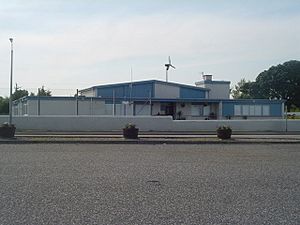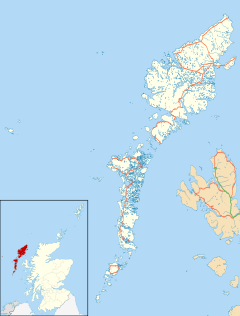Tong, Lewis facts for kids
Quick facts for kids Tong
|
|
|---|---|
 Tong School |
|
| Population | 527 (2001) |
| Language | Scottish Gaelic English |
| OS grid reference | NB448365 |
| Civil parish | |
| Council area | |
| Lieutenancy area | |
| Country | Scotland |
| Sovereign state | United Kingdom |
| Post town | ISLE OF LEWIS |
| Postcode district | HS2 |
| Dialling code | 01851 |
| Police | Northern |
| Fire | Highlands and Islands |
| Ambulance | Scottish |
| EU Parliament | Scotland |
| UK Parliament |
|
| Scottish Parliament |
|
Tong (which is Tunga in Scottish Gaelic) is a small village in Scotland. It is located on the Isle of Lewis, about 4 miles (6.4 km) northeast of the main town called Stornoway. Tong is found along the B895 road, which leads to other places like Back and Tolsta.
In 2001, about 527 people lived in Tong. Fishing is an important part of how people make a living here. The Scottish mainland is about 40 nautical miles (74 km) away. You can reach it by taking a two-hour ferry ride.
Contents
A Look Back in Time
For a long time, until the 1200s, the Isle of Lewis (including Tong) was actually part of Norway. By the 1800s, people in Tong mainly worked in fishing, farming, and weaving cloth.
Later in the 1800s, many landowners across Lewis started to change their farms. They wanted to raise sheep and create large areas for deer hunting. This meant that many families who had lived on the land for generations were asked to leave. This event is known as the Highland Clearances. Many of these families moved to villages like Tong, which led to a lot of people living in a small area. One historian described the situation as very difficult for the people.
Land Raids and Community Spirit
Between 1919 and 1921, Tong and nearby villages like Coll and Gress became known for "land raids." This is when men would go onto large estates that were not being used much and start planting crops or marking out farms. They did this to show that they needed land to live and farm.
Tong was seen as a place where people were very determined to make changes. A Scottish socialist named John Maclean visited Tong after World War I. He called it a "hotbed of insurrection," meaning it was a place where people strongly wanted to change things. Even years later, people from Tong were sometimes called "Bolshiveeks" in local slang. This was a nickname given to people who were seen as very radical or wanting big changes.
Challenges and Changes
The early 1900s were a tough time for Tong's economy. Crops were not growing well. The herring fishing industry, which was very important, lost many customers because of Prohibition in America and the Russian Revolution. These events stopped the trade of fish.
On top of that, the 1918 flu epidemic caused many deaths. World War I also took the lives of thousands of men from the Hebrides. The government had promised land to the soldiers who survived, but these promises were not kept. All these problems made life very hard. Many young people also used to meet their future partners during summer social events, but these events became less common.
People had been leaving Lewis for a long time to find work elsewhere. But all these difficulties made even more people decide to move away from the island.
Around 2016, Tong received a lot of attention because of Donald Trump. His mother, Mary Anne MacLeod, was born in Tong. The land around Tong is mostly flat and marshy, with areas of peat. Fishing and sheep farming are still important parts of the local economy today.
Village Life Today
Tong has a community center where people can gather. It also has a football pitch for sports. There is a primary school for the children in the village. For religious gatherings, there is a Free Church of Scotland mission house and a Scottish Episcopal Church meeting house.
Culture and Sports
Every July, the Lewis Highland Games are held at the community center. This event includes exciting activities like tossing the caber, Highland dancing, and bagpipe competitions. There are also other attractions on the football pitch. The Lewis Highland Games have been held in Tong since 1977. They are the second oldest Games on the Isle of Lewis. The local football team is called Tong FC.
Famous People from Tong
- Sìne NicFhionnlaigh: She was a composer who wrote the famous song "Fear a' bhàta" and lived in Tong in the 1800s.
- Mary Anne MacLeod: She was born and grew up in Tong. She is the mother of former U.S. President Donald Trump.
- Alasdair White: He is a talented fiddler who plays with the Battlefield Band. He was born in Tong.
Gallery
-
View towards Point (An Rubha), Broadbay (Loch a Tuath) and Stornoway Airport (Port-adhair Steòrnabhagh)
 | John T. Biggers |
 | Thomas Blackshear |
 | Mark Bradford |
 | Beverly Buchanan |










